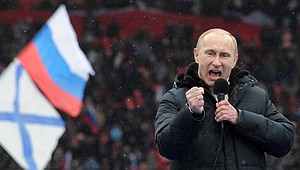12/18/2018

By Kara Fox, Mary Ilyushina and Nathan Hodge, CNN
(CNN) -- In Russia, a rap war is raging, but it's not between battling MCs.
Russian President Vladimir Putin, who has previously commended rappers for bringing societal issues into the limelight and invited a popular artist to perform at his presidential inauguration earlier this year, has said that rap is part of the country's culture and that it is up to the government to manage it.
"This is part of culture, this is part of our common culture, so it needs to be treated with great caution," Putin said at a meeting of the Presidential Council for Culture and Art in St. Petersburg on Saturday.
"If it is impossible to stop, then it is necessary to navigate and guide accordingly," Putin added.
The Russian president was responding to a debate about official efforts to crack down on rap artists -- actions that have raised concerns about freedom of expression in the country.
Cancellations surge
Since October, at least seven performers -- most of them rappers -- have had their concerts canceled because of law enforcement raids or other pretexts, according to Human Rights Watch (HRW).
The Calvert Journal -- which is published by London-based non-profit Calvert 22 and features analysis on contemporary culture in Russia and the region -- reported that a wide range of gigs had been canceled throughout 2018, ranging from punk shows and small festivals to larger, more influential hip hop and rap outfits.
In November, the high-profile arrest of one of the country's most famous rappers catapulted the country's rap conundrum into the global spotlight.
Dmitry Kuznetsov, aka Husky, was arrested and jailed on charges of "minor hooliganism" after performing for fans on the street in the southern city of Krasnodar.
Husky, 25, was sentenced to 12 days in prison for rapping from the rooftop of a car after his concert was canceled at the last minute.
The venue where Husky was scheduled to perform pulled out due to a warning from the local prosecutor's office who said the rapper's lyrics were going to be "checked for extremism," according to HRW, citing local media Lenta.
Another venue opened its doors to Husky at the last minute, but as the rapper began to perform, the venue's electricity was cut, prompting him to perform to fans who had spilled out onto the street, HRW reported.
Husky -- who often raps about poverty, corruption and police brutality -- wrote on Russian social media platform Vkontakte that several of the scheduled concerts on that tour had been canceled by authorities who allege that his lyrics promote sexual debauchery and are religiously offensive.
Following his arrest, prominent rappers Oxxxymiron, Basta and Noize MC organized the "I'm Going to Sing My Music" charity concert in Moscow.
Oxxxymiron, whose real name is Miron Fyodorov, said on Twitter: "This is not just about Husky but about all of us and the future of music in our country."
Just hours before the event, Husky was released from prison and the charges were dropped.
The gig drew a packed crowd of hip hop devotees and activists, including opposition leader Alexei Navalny, who claimed that Husky was released because the Kremlin wanted to avoid the concert turning into a "manifestation for freedom of speech and creativity."
Margarita Simonyan, the Editor-in-Chief of Russia's state-sponsored television network RT, said on Twitter that a few Kremlin officials found out about the case and personally intervened. "When two or three people at the President's Office are outraged by a particular occurrence, things usually turn out well," she said.
'Degradation of the nation'
Husky's arrest has ignited a national debate about the future of Russian rap and the role that the Kremlin could play in further shaping the art form, an evolving genre that is widely popular with the country's youth.
Earlier this month, the State Duma, the country's lower chamber of parliament, announced it would hold a rap competition on the subject of Russian travel, which has drawn parallels to Soviet-era censorship of the arts.
The Duma also invited a group of popular rappers to a roundtable discussion about the controversial concert cancellations.
There, veteran rapper Ptaha, real name David Nuriev, warned against any proposed censorship of rap lyrics and suggested that the genre had become a scapegoat to hide social problems affecting young people in Russian society.
"I think it is necessary to be engaged in raising kids, change the education system, the upbringing system in principle, it must be changed. Just a bunch of conservatives sitting there and blaming artists, rappers and other people for something they failed to solve themselves. I am just shocked," he wrote of the meeting on Instagram.
In remarks posted on the Kremlin website this weekend, Putin said that "rap and other things that are modern forms of expression rest upon three pillars: sex, drugs and protest," and said he was the most worried about rap lyrics that glorified drug use.
"Of all this, of course, drugs are the most worrisome. This is an obvious thing, this is the path to degradation of the nation," he said.
Putin added that he had spoken with a researcher who specialized in obscene lyrics.
"I was told that it is part of our language," he said. "But the question is just how to use it. We have all sorts of body parts, but it's not like we put them on display all the time."
While the Kremlin plans to provide a guiding hand to its rappers, it's clear that some rappers will refuse to take it.
In November a defiant Husky said: "I could write, as they say, stop putting pressure on me, I do not call for anything and do not insult anyone. But no: I insult specifically you, I the servant, and I tell you to go disappear somewhere forever and for good with your cool little ideas."
